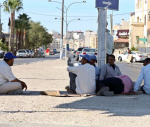You are here
Book reviews effect of religious interpretations on ‘authoritarian’ regional politics
By Dana Al Emam - Aug 02,2017 - Last updated at Aug 02,2017
AMMAN — Tailoring the religious discourse to serve political ends has empowered authoritarian regimes in the region over centuries and suppressed rights and freedoms, a new book suggests.
In various moments throughout history, religious figures in the region have issued contradicting religious edicts — known as fatwas — based on changing political conditions and to serve rulers, according to constitutional expert and former minister Mohammad Hammouri.
Speaking at the launch of his new book at the Arab Thought Forum (ATF) recently, Hammouri cited examples of partial interpretations of religious texts that have evoked people’s religious sentiments with the intention of stopping the governed from questioning their rulers.
This hegemony of politics over religion has “planted fear among people” and prevented people from expressing their true thoughts, he said, noting that clerics have encouraged people to “blindly follow their rulers”, an issue that has placed the power of rulers above that of constitutions.
From 661 AD until 1924, when the Ottoman rule ended, Arabs have excelled in all sciences and fields of knowledge, except for politics, as they feared challenging their leaders, Hammouri argued.
In four chapters, the book discusses the relationship between freedom of thought, religion and authority. It also studies the emergence of democratic regimes in Europe and why the constitutions of these democracies, which were imported to this region via imperialist and colonial European expansions, have failed to revive rights and freedoms in this part of the world.
Commenting on the book, the forum’s secretary general, Mohammad Abu Hammour, noted that the absence of enlightened thought which championed reform has, over centuries, contributed to exacerbating a crisis between leaders and peoples, and has fed extremism.
Describing the publication as a “rebellious” one, former health minister Zeid Hamzeh said that the uprisings in the region that started in 2011 have sought to achieve democracy and to instill rights and freedoms, which are granted by the constitutions of the countries of the region, but which are “not applied effectively”.
Historian and Professor Ali Mahaftha said that the book documents Hammouri’s refusal to be a “silent witness” on the political developments of his time.
Meanwhile, he disagreed with Hammouri’s connection of the shura principle with democracy, claiming that doing so will further complicate the relation between religion and politics.
Shura, meaning “consultation” in Arabic, is a form of Islamic consultative decision-making system.
For his part, Salem, a former overall leader of the Muslim Brotherhood, said the “encyclopedic” book has set a group of rules to establish relations between the individual, religion and politics.
Falahat argued that the absence of self expression and freedoms among many generations has instilled a type of mental “slavery” towards rulers, in a manner that made people “forget what freedom is”.
He added that people from all origins and backgrounds should come together and agree that they have to be “the source of authority”, while rulers and decision makers have to enact the comprehensive reforms that the people want.
Related Articles
AMMAN — The Arab Thought Forum (ATF) on Sunday held a ceremony to launch a book titled “Lost Freedoms in Autocracy and Exploitation of Relig
AMMAN — Through its role in overseeing the constitutionality of laws and interpreting the Constitution, the Constitutional Court is a fundam
AMMAN — His Majesty King Abdullah’s sixth Royal Discussion Paper is a “timely critique” of ways in which individuals and institutions violat
















